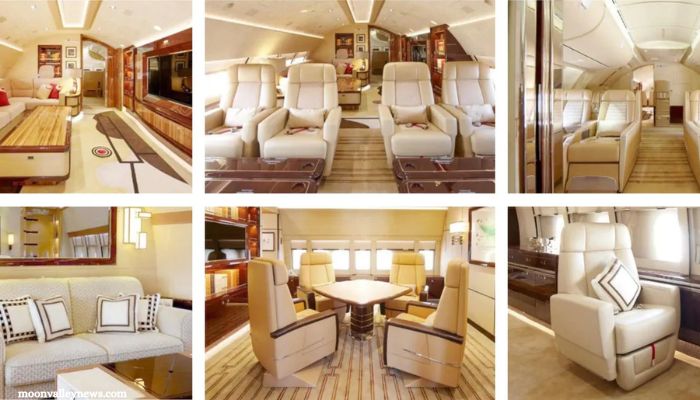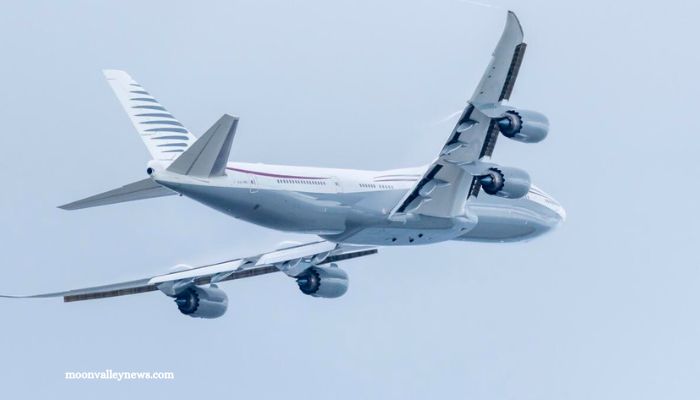As President Donald Trump remains publicly frustrated with Boeing’s delayed delivery of the next Air Force One, an unlikely opportunity has emerged from the Persian Gulf. Qatar’s royal family, long associated with extravagant air travel, appears eager to offload one of its Boeing 747-8 jumbo jets—and may have found the perfect recipient in Trump.
Though some speculate this is a diplomatic play aimed at currying favor with the former president, the real motive may be more pragmatic: the Qataris simply don’t want the jet anymore.
Read More:16 Must-Have Crochet Tote Bags for the Ultimate Summer Look
A Costly Aircraft With Few Takers
The 747 in question, tail number A7-HBJ, is no ordinary airliner. Commissioned by former Qatari Prime Minister Hamad bin Jassim bin Jaber Al Thani, the jet is outfitted with opulent interiors designed by Cabinet Pinto, a Parisian firm. The jet includes two bedrooms, meeting spaces, and lavish finishes like sycamore and wakapou wood, silk, and natural leather—fitting for its $367 million list price (not including interior customization).
Yet the aircraft has struggled to attract buyers since being quietly listed for sale in 2020. According to aviation experts, simply maintaining and storing a plane of this size and complexity runs into the millions annually. By gifting it, Qatar avoids those ongoing costs—and Trump’s potential satisfaction is merely a diplomatic bonus.
The End of the “Flying Palace” Era
Qatar’s move is part of a broader trend: the global retreat from fuel-guzzling, ostentatious aircraft like the Boeing 747-8 and Airbus A340. Once symbols of national prestige and royal power, these four-engine giants are increasingly viewed as relics in an age prioritizing efficiency and discretion.
“Qatar, like many modern states, is shifting toward leaner, more versatile aircraft, which offer better economics and a more discreet presence,” said Linus Bauer, managing director of Dubai-based aviation consultancy BAA & Partners. Donating the 747 to Trump, he adds, would be a “creative disposal strategy” and a symbolic farewell to an outdated model of diplomatic projection.
Indeed, Qatar has previously gifted similar aircraft, including a 747-8 given to Turkish President Recep Tayyip Erdoğan in 2018. Another older 747-SP was handed to an asset management firm and appears to have been placed in storage.
Operating Costs That Soar Above the Clouds
The 747-8’s operating cost—estimated at $23,000 per flight hour—is a steep price even for oil-rich monarchies. Airlines and governments alike are transitioning to more fuel-efficient aircraft, such as the twin-engine Boeing 787 and Airbus A350. Larger jets like the 747 also face logistical limitations: they can only land on runways of sufficient length and are more conspicuous targets in geopolitical hotspots.
Security concerns add another layer of complication. “These things are big targets,” noted aerospace consultant Richard Aboulafia. “There are a lot more airports you can get into if you have a narrowbody, and many more still if you have a traditional business jet.”
A Gift Wrapped in Red Tape
While Trump has praised the potential acquisition as a cost-saving gift for American taxpayers, national security experts and defense insiders are skeptical. Transforming a foreign-donated 747 into an official Air Force One replacement would involve extensive modifications: secure communications, nuclear-blast shielding, and missile defense systems, to name a few.
The process would take years—possibly five or more—and negate any immediate cost savings. “I can’t imagine any well-trained senior Air Force officer saying this is a good idea,” said Aboulafia.
Moreover, the ethics of accepting such a lavish gift from a foreign government has raised eyebrows among both Democrats and Republicans, especially given Trump’s existing business ties to Qatar.
Trump’s Interest and the Delays at Boeing
Trump has repeatedly criticized Boeing over the delays in the $3.9 billion program to deliver two customized 747s as Air Force One. Originally scheduled for 2024, Boeing’s timeline has slipped to 2028 or 2029, though recent reports suggest 2027 may be feasible if some requirements are relaxed.
Boeing has encountered delays with suppliers, wiring designs, and a shortage of cleared personnel for a project requiring top-level security. During his presidency, Trump even asked Elon Musk to find ways to expedite the process.
Qatar’s Strategic Soft Power
For Qatar, the offer fits within its broader strategy of leveraging wealth to build influence. The nation hosts the largest U.S. military base in the Middle East, Al Udeid, and has invested billions into American universities, think tanks, and even Trump family ventures. A Trump-branded golf course is planned in Doha, and Jared Kushner’s investment firm has received backing from Qatari sovereign funds.

Even without the 747, the royal family retains a robust fleet, including two other 747-8s (one of which may have been mothballed) and a range of Airbus, Boeing, Bombardier, and Dassault aircraft for official and personal use.
“They won’t miss it,” said business aviation consultant Brian Foley.
A Diplomatic Gesture or a Flying White Elephant?
The luxurious 747 may appeal to Trump’s sense of grandeur, but whether it will become a functional tool of statecraft or a costly white elephant remains to be seen. For Qatar, however, it’s a savvy move: eliminate a financial burden, score diplomatic points, and quietly retire a symbol of an era that has passed.
Frequently Asked Queations
Why use the word “Gift” in quotation marks?
The quotation marks indicate ambiguity—suggesting that while the 747 might appear to be a gift, it may also serve practical or political purposes. It prompts readers to question whether it’s a genuine offering or a strategic move.
What does “Strategic Disposal” imply?
“Strategic Disposal” suggests that Qatar isn’t simply giving the plane away on a whim—it’s a calculated decision to offload an expensive and obsolete asset in a way that may also provide diplomatic benefits.
Why include “Diplomatic Sweetener” in the title?
This phrase implies the action could be a form of soft diplomacy—a way for Qatar to strengthen ties or curry favor with Trump or the U.S. government without a formal agreement or obligation.
Why frame the title as a question?
Framing it as a question piques curiosity and sets the tone for a nuanced article. It invites readers to explore both sides of the story rather than presenting a one-sided narrative.
Is the title neutral, critical, or supportive?
The tone is analytical and neutral. It doesn’t accuse Qatar or Trump of wrongdoing but presents the situation as one worth deeper examination.
Who is the intended audience?
This title is aimed at readers interested in politics, diplomacy, aviation, and global affairs, including policymakers, analysts, and engaged citizens.
Conclusion
Qatar’s apparent willingness to hand over one of its opulent Boeing 747-8s to Donald Trump is far more than a simple act of generosity—it’s a case study in modern geopolitics, asset management, and strategic diplomacy. While the gesture may appeal to Trump’s frustration with the delayed Air Force One replacement, experts caution that converting such a luxury aircraft into a secure presidential jet is neither quick nor economical.
For Qatar, the offer serves multiple purposes: it eliminates the burden of maintaining an aging, high-cost aircraft, potentially strengthens ties with a former U.S. president, and underscores a broader shift away from extravagant state-owned flying palaces. As royal families and governments around the world modernize their fleets and embrace discretion over display, Qatar’s move is both symbolic and practical—a farewell to a bygone era of airborne diplomacy.







